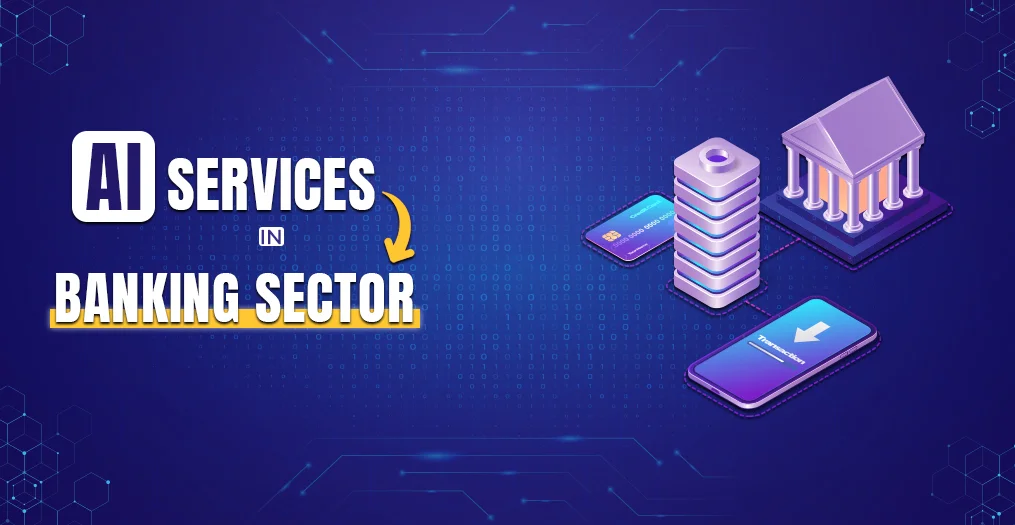Artificial Intelligence in 2023 for Banking Sector
Artificial Intelligence in 2023 for Banking Sector
Artificial intelligence has changed every form of the banking process. AI technologies are accelerating banking processes quicker, securing money transfers, and improving back-end operations.

AI in Banking
Artificial intelligence in the banking sector makes banks efficient, trustworthy, beneficial, and more understanding. In this digital age, it is reinforcing the competitive edge of modernized banks. The increasing impact of Artificial Intelligence in the banking sector reduces operational costs and enhances customer services and process automation.
Artificial intelligence is a vital part of the banking sector, assisting with delivering affordable and trustworthy banking services. With an anticipated CAGR of 32.6% from 2021 to 2030, the industry for Artificial Intelligence in the banking Sector, worthed at $3.88 billion in 2020, is projected to reach $64.03 billion by 2030.
Artificial Intelligence enables banks to handle record-level high-speed information to get valuable vision. Furthermore, features like digital payments, Artificial Intelligence bots, and biometric fraud detection systems lead to high-quality services for a large client base. Artificial Intelligence consists of a large set of technologies involving, but not limited to, Machine Learning, Natural Language Processing, Robotics Process Automation, Vision, Speech, Planning, etc.
The adoption of Artificial Intelligence in different businesses has expanded due to the COVID-19 pandemic. Because the pandemic hit the globe, the possible value of AI has grown essentially. The aim of AI adoption is restricted to developing the effectiveness of operations. However, AI is becoming more essential as companies automate their daily operations and understand the COVID-19-impacted datasets. It can also be utilized to improve partner satisfaction.
Why use AI in Banking Sector?
AI is being adopted in the banking sector for several reasons:- Improved efficiency: AI can automate repeated tasks and make processes powerful, reducing the time and resources needed for specific operations.
- Enhanced customer experience: AI-powered chatbots and personalized marketing campaigns can provide customers with quicker and appropriate data, developing their overall experience.
- Better decision-making: AI can analyze huge amounts of information, enabling banks to make informed decisions more rapidly and accurately.
- Increased profitability: By reducing costs and improving efficiency, AI can potentially increase bank profitability.
- Mitigating risks: AI can help identify and prevent fraud, manage credit risks, and detect money laundering.
- Staying competitive: Banks that adopt AI will be better positioned to compete in an industry that is increasingly relying on technology.
Applications of AI in banking Sector
The use of AI in the banking sector is projected to continue to grow and expand in 2023. There are some common applications of AI in banking include:- Robotics Process Automation: RPA algorithms improve operational effectiveness and certainty and decrease costs by automating tedious, repeated tasks. This also enables the customer to target complicated processes needing human involvement.Nowadays, banking companies successfully influence RPA to increase transaction speed and increase productivity. For instance, JPMorgan Chase’s Coin technology reviews files and extracts information from them much more quickly than humans can.
- Cybersecurity: AI can essentially work on the adequacy of cybersecurity systems by utilizing information from previous threats and learning the patterns and signals that might seem unrelated to predict and avoid attacks. Moreover, by preventing external threats, AI can supervise internal threats or breaches and suggest corrective activities, avoiding data theft or abuse.
- Chatbots: Chatbots are the best instance of how artificial intelligence is used in banking. They might work any time they need once set up, in contrast to the person who has already set running time. They also intend to learn more about a particular customer’s usage patterns. It helps them understand consumer expectations effectively.The banks may ensure that they stay accessible to their customer 24 hours a day by integrating bots within current banking apps. Moreover, chatbots can provide targeted client attention and make suitable financial service and product recommendations through understanding customer behavior.
- Chatbots: Bankers can examine large amounts of information and forecast the current economic movements, products, and equities thanks to artificial intelligence in a financial organization. Current machine learning techniques provide financial suggestions and help in calculating market sentiments. AI for banking prescribes when and how to purchase equities and sends alerts when there is a possible consequence. This state-of-the-art innovation furthermore helps with the speed of decision-making. It makes trading appropriate for both banks and their customer because of its robust data computational power.
Loan and credit decisions
Banks have started implementing AI-based frameworks to secure the commercial loan and credit decisions better. Currently, several banks still need to be more restricted to the utilization of credit history, credit scores, and client references to decide the reliability of an individual or company.
An AI-based loan and credit system can view the behavior and design of clients with limited credit history to decide their reliability. Also, the system sends warnings to banks about particular behaviors that might enhance default circumstances.
In 2023, the use of AI in the banking sector has become extensive and has brought several advantages to the industry. AI has allowed banks to improve productivity, decrease costs, and increase the user experience through personalized services. AI-enabled chatbots and virtual assistants have created banking services that are usable and convenient. Moreover, AI has helped banks to identify fraud more efficiently and improve risk management. Despite the advantage, there are concerns about the possible negative effect of Artificial Intelligence on work in the banking sector and the requirement for regulation to ensure that AI is used morally.
